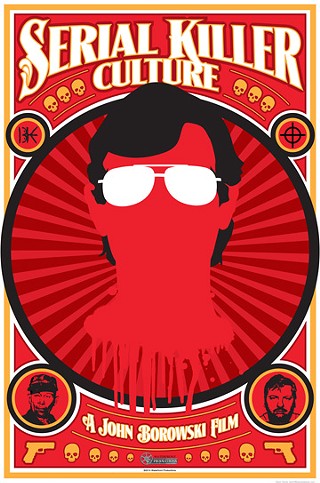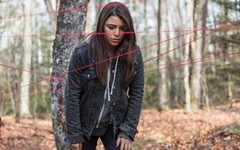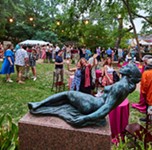DVDanger: Real Monsters
Documentarian John Borowski studies Serial Killer Culture
By Richard Whittaker, 8:00AM, Sat. Jan. 10, 2015
Gacy. Dahmer. Gein. Serial killers are the ultimate folk monsters, media obsessions from news to fiction. But society often deems anyone with more than a passing interest as being nearly as bad as the killers. Documentarian John Borowski wants to set that record straight. "I want to study serial killers," he said, "not become one."
After three documentaries about individual killers (H.H. Holmes, Albert Fish, and Carl Panzram), Borowski dissects Serial Killer Culture in his latest film. It's not about the murderers themselves, but the people fascinated by them: musicians, artists, collectors, dealers, the whole underground industry.
Pop culture has always been fascinated with gory death. Take the murder in the Red Barn: In 1827, Maria Marten was shot by William Corder, and before his trial was complete, there were plays and a penny dreadful melodrama. After he was hanged, the rope from the noose was sold off by inches, and the murder scene was stripped to the walls by the fascinated crowd.
More recently, when it comes to true crime, the wisdom increasingly seems to be based on Nietzsche's caution: "Battle not with monsters, lest ye become a monster." It's perfectly OK for Fox to go wall-to-wall with increasingly lurid and speculative coverage of the Charlie Hebdo murders. However, Borowski contrasts that mainstream grandstanding with the legal prosecutions of Hart Fisher, author of Jeffrey Dahmer: An Unauthorized Biography of a Serial Killer, who knows more about living with the consequences of extreme violence than any of the tut-tutting critics. For Borowski, the fact that the Nancy Graces of the world make serial killers into superstars and ratings-grabbers, while criticizing people who look deeper into the underlying horror, is "the ultimate hypocrisy. If they're doing it themselves, that's OK. But if someone else is doing it, that's wrong."
Serial Killer Culture is a closer examination of the morbid topic. "This is where real-life monsters come from," warns criminal investigator Stephen Giannangelo in Borowski's film. "It's not someone from a Universal Studios movie. It's someone that actually lives in Milwaukee that brings people home and eats them." It's often gruesome stuff, with a moment when Borowski audibly groans as Rick Staton (known as John Wayne Gacy's art dealer) shows him horrifying crime-scene photos. Like Borowski, Staton points the finger at the mainstream media outlets that present a dishonest, sanitized version of killer culture. As he tells the camera, "If this offends you, then you need to start back with Life magazine and the Channel 2 news at 6 o'clock."
Austin Chronicle: You've done a series of documentaries about serial killers. The first question for you is, what is it about this subject that has drawn you in?
John Borowski: I always enjoyed horror films, and these to me are true-life horrors. They are our modern monsters. Their crimes are horrific. But what I'm interested in is the psychology of the serial killer. Most of them have an extreme psychopathy, like Ed Gein, who would dig up bodies and make lampshades out of their skin. Or Jeffrey Dahmer, who was a cannibal. Or Albert Fish, who believed he was doing God's work by murdering little children and drinking their blood and eating their flesh, and associating this with communion. Myself, as much as anyone else, I want to understand why they do these things, even though we still don't have the answers.
AC: When I was growing up, the Yorkshire Ripper was the bogeyman for anyone in the North of England. Was there a similar figure for you, or a turning point that made serial killers so central?
JB: My turning point was when I was in high school, and Jeffrey Dahmer was apprehended. I didn't really realize the extent of serial killers growing up until, here I am as a teenager, I'm hearing not just about these murders, but that he was a cannibal, and that he had these body parts in his apartment, and he lived with them and wanted to create altars from their bones. That really fascinated, and that was really horrific.
In addition to that, my friend had a father who was a detective at the time, and he had the Dahmer case file. So I was unfortunate enough to see photocopies of the Polaroids that Dahmer took of the decapitated heads in the sink, with their eyes open and their mouths open in terror from when he strangled them and decapitated them. So that made such an impression on me that I did a short film in college called "State of Mind".
Then I went searching Chicago history, and I heard of the murder castle of H.H. Holmes, the torture doctor. That's interesting, but when I did more research and found he went to medical school, and had numerous wives, and was a master manipulator, well, I found him extremely interesting. In that period of history, the late 1800s, we've all heard of Jack the Ripper, but no one compares to H.H. Holmes, who designed this building. He was an evil genius. So I decided to do a documentary, and do these re-enactments in the style of grainy, black-and-white movies, the Universal Horror films that I loved so much growing up.
AC: What's fascinating is that, while people are aware that these horrors exist, they almost keep them at arm's length, and refuse to admit that they could happen near them. That creates the environment for serial killers to get away with it.
JB: I think that, as human beings, we ultimately, deep down inside, want to trust other people, and don't want to admit that we have a cannibal living next to us. It happens over and over, like with Jeffrey Dahmer: They smell the decay, and nobody does anything about it. In the end, they hear sounds and electric saws cutting. Dennis Rader (the BTK Killer), he was in the community and nobody knew or suspected. I think it's the hesitancy to believe that our friends and family members are doing this. Imagine the wives and children of these serial killers that don't want to believe, even if they do find out. There was an Indiana serial killer, Herb Baumeister, that would pick up men and bring them back to his country cottage. His wife and children denied that he ever did those murders, even though there was all this evidence, all these bodies and skeletons.
I find those interesting that later, after they're apprehended, people come forward and say, yeah, they were a little odd, but they never think anything of it, because they don't want to. And that's the duality of a serial killer. You have no idea that they're doing these awful things, and we don't want to know.
Serial Killer Culture is available on DVD from www.johnborowski.com.
A note to readers: Bold and uncensored, The Austin Chronicle has been Austin’s independent news source for over 40 years, expressing the community’s political and environmental concerns and supporting its active cultural scene. Now more than ever, we need your support to continue supplying Austin with independent, free press. If real news is important to you, please consider making a donation of $5, $10 or whatever you can afford, to help keep our journalism on stands.
Richard Whittaker, April 19, 2018
Richard Whittaker, April 3, 2018
April 19, 2024
April 19, 2024
Serial Killer Culture, DVD Watch, DVDanger, John Borowski, Stephen Giannangelo, Rick Staton, Albert Fish, H.H. Holmes











